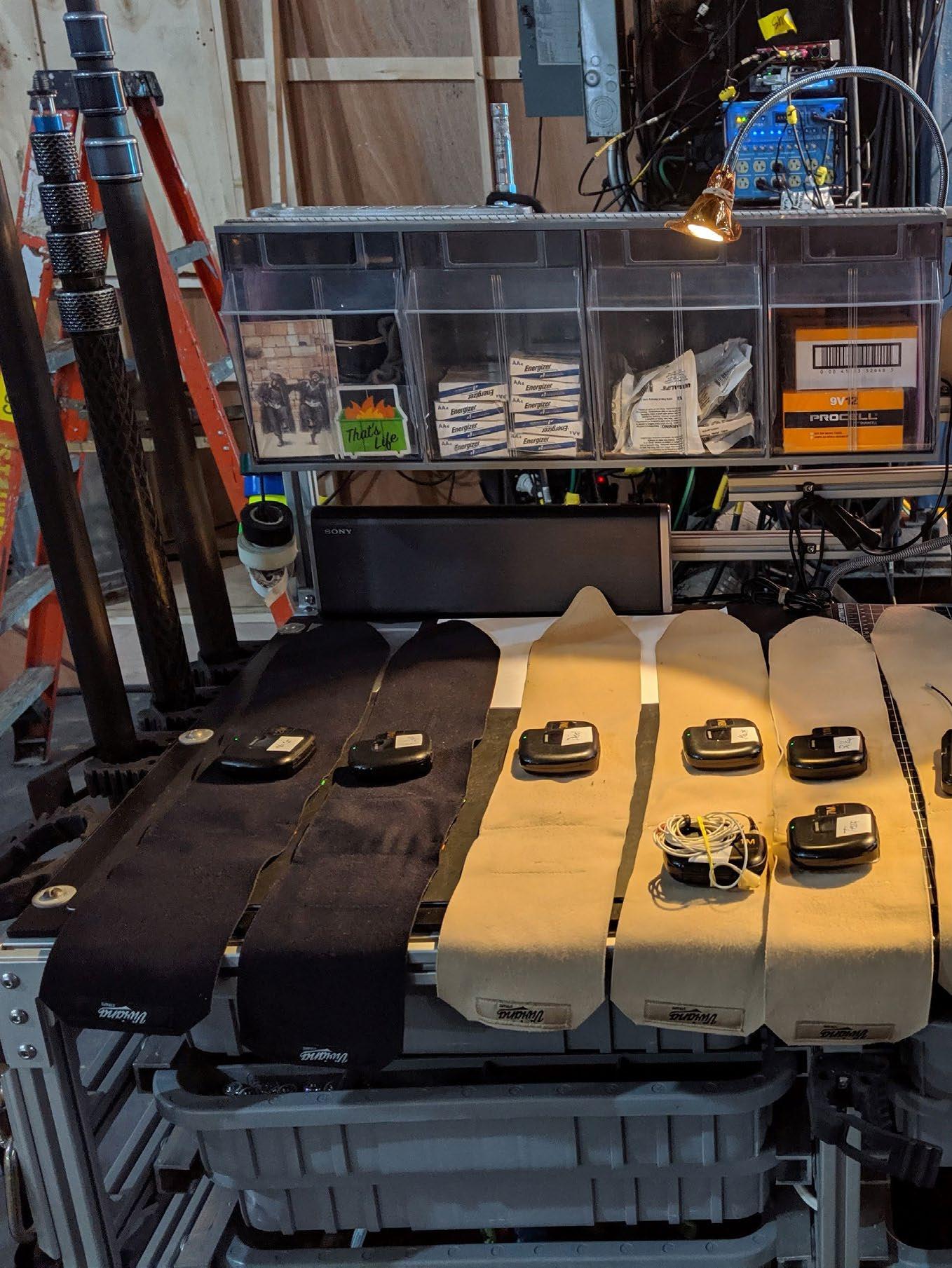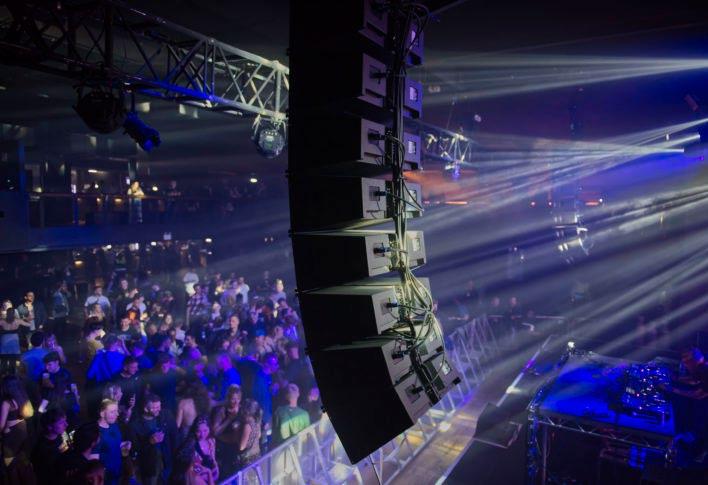
6 minute read
Security: How AV is keeping one step ahead
also made an impact on pro audio business. These include a severe shortage of electronic components, which was already happening pre-Covid, an increase in shipping costs, exacerbated by the pandemic, the blocking of the Suez Canal in March 2021 and the UK leaving the European Union (EU). "One of the core ongoing things in the market is stock supply," observes Turney. "It goes back much further than just the manufacturers not having product on the shelf to the chip set manufacturers not having stock and beyond that to raw materials not being dug up for the better part of two years."
Even without the complications of supply shortages, the pandemic made some manufacturers very cautious in their production strategies. "We took the opposite approach [because] we understood there was going to be some hesitancy among buyers in the early stages but we were extremely confident about the long-term prospect for the industry," says Joe Andrulis, executive vice president of corporate development at Biamp. "We doubled down on inventory, both in raw materials as well as finished goods, with the expectation that those who perhaps were a little more conservative might struggle to supply as demands began to rebound."
The supply chain is beginning to return to expected levels but that is taking time. Brexit has added to this, with increased paperwork and apparently some freight forwarding companies initially not being prepared enough, which caused further delays. Alex Lepges, technical director for EMEA region at Audio-Technica Europe, comments that Brexit has made logistics between the UK and the EU "more complex", while allocating stock between the two sides is "more challenging" now. "We will see what the future brings in terms of trade agreements between the UK and EU when the governments have time to look into this post-Covid and [after] other challenges to deal with currently."
BREXIT BAD
Joe Bull, managing director of hard disk recorder developer JoeCo, is more forceful in his assessment of the UK no longer being in the EU. "The impact of Brexit has been even worse than the pandemic," he says. "The ability to ship goods into Europe quickly has been completely destroyed. A shipment that three years ago would have taken two days door-to-door can often take over a month now with fully accurate and correct paperwork. European customers are looking to suppliers from other countries as the UK is now seen as a little backwater populated by idiots."
Bose's Hans Vereecken is not quite as damning but does says there have been "multiple impacts" on business, beginning with importing products into the UK. "It now takes additional time and increases both the workload and cost," he says. "Additionally, product certification, including the UK CA mark [for machinery safety and compliance] next to CE certification (EU conformity), requires a significant amount of work to update products and the whole supply chain."
International companies have not been immune to the fallout from Brexit but the effects have varied. "As a global manufacturer based in the EU, Brexit did not have a huge impact on day-to-day business," comments Jonathan Reece, head of global sales strategy for KV2. "As the UK distributor, personally it has been a slightly frustrating time for me, with extended transit times, excessive paperwork, moving goalposts and subsequent fees to carry out the same activities as you have been doing for years."
For James King at Martin Audio, disruption to the supply chain resulting from the pandemic is difficult to separate from those caused by Brexit: "As a global supplier we took steps before Brexit to ensure we had available stock and warehousing space within


Above:
d&b audiotechnik loudspeakers rocking the Birmingham Forum
Above:
Shure ADX1M bodypack transmitters on the set of West Side Story the EU so our delivery times wouldn't be affected. The supply chain issues for components is being felt all over the world. It won't be until this is sorted out that we will be able to truly see any impact that Brexit has had on our business."
WAVES SUBSIDE
Some companies are already seeing improvements and getting a sense of how the market will continue with the UK out of the EU. "Now the initial waves of uncertainty have receded, things are stabilising," says Ole Jensen, international sales director of Genelec. "As an EU manufacturer there have been no real changes in activity on the pro audio side, while online MI sales going from mainland Europe to the UK, and vice versa, have more or less ceased."
Shure has not experienced a direct impact on regional sales due to Brexit, although, as Peter James, vice president of global sales for pro audio, concedes, it is still difficult to tell given the problems caused by Covid. "There have certainly been administrative challenges," he says, "and many customers in the live music sector face new difficulties in staffing and documenting European tours that include or originate from the UK."
The world health crisis, combined with political and commerce issues, has somewhat overshadowed technology considerations over the last few years, but Kalle Hvidt Nielsen at DPA finds a positive from Covid in that it "ramped up" the transition from analogue to AoIP. "We've also seen a shift from passive speakers towards active speakers," he adds. Ian Bridgewater of TOA observes that AoIP "allows interaction between different product ranges, giving greater flexibility in combining systems". Certainly AoIP can now be seen as well established for networking in pro audio, to the point where it is what Joe Andrulis at Biamp calls "a baseline technology".
Of emerging technologies, Andrulis highlights audience engagement systems, which are intended to improve the interchange between a presenter and the audience for a more participative experience. He also calls spatial audio a "hot thing right now",

particularly in creating immersive environments. Alex Lepges at Audio-Technica describes immersive audio as the "big challenge to find creative solutions to match the expectations of listeners". David Claringbold from d&b sees it as a "driving force of innovation" in pro audio, with interest increasing since the pandemic.
CLOUD TECH
LEA Professional's Blake Augsburger cites something that is already making its mark on the consumer and broadcast markets as a consideration in pro audio. "Cloud technology has gone from a nice thing to have to being a must-have in the industry," he says. "The capability delivers greater visibility to provide preventative maintenance, easier troubleshooting and fewer on-site maintenance requirements." (See page 41 for more from Augsburger on this subject.)
For James King of Martin Audio, DSP to control and optimise the soundfield is the most important technology driver today: "DSP has been and will continue to be a major part of modern audio systems. Long sessions tuning audio systems and 'cheap seats' are quickly becoming a thing of the past as our ability to use DSP creates the same sonic experience for every seat in the house."
ROMANTIC HOPES
Those seats are now being occupied again as audiences return to theatres and concert venues. Peter James at Shure concludes that there are high, almost romantic hopes for pro audio and the general entertainment market after the uncertainty and disruption of the last few years. "The outlook is very positive, with talk of an artistic renaissance appearing to be real and likely," he says. "Artists and audiences have been starved of live performance and the appetite to get back is higher than ever. Technology will play its part and there are exciting things to come that will improve the audience experience."
Above:
Martin Audio WPS Optimised Line Array in a theatre installation
READ ONLINE: If you prefer to read this article off-page, on our website, please click here. Or go to: https://bit.ly/3KuL1ch











